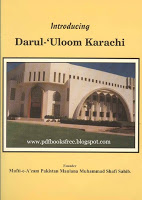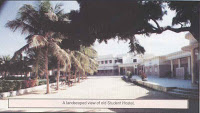 English book “Introduction Darul Uloom Karachi” compiled by Maulana Aziz-ur-Raman, Ustadh Jamia Darul Uloom Karachi under the guidance of Hadrat Maulana Muhammad Rafi Usmani President of Darul Uloom Karachi, Rendered into English by Muhammad Sameem.
English book “Introduction Darul Uloom Karachi” compiled by Maulana Aziz-ur-Raman, Ustadh Jamia Darul Uloom Karachi under the guidance of Hadrat Maulana Muhammad Rafi Usmani President of Darul Uloom Karachi, Rendered into English by Muhammad Sameem. Then, the conclusive struggle for the establishment of Pakistan made by Shaikh ul Islam Allamah Shabbir Ahmad Usmani (r.a), Shaikh ul Hadith Hadrat Maulana Zafar Ahmad Usmani and Mufti e Azam Pakistan Hadrat Maulana Mufti Muhammad Shafi r.a was historic. Initiated with the approval and blessings of the wise counselor and renovator of the Muslim community, Hadrat Maulana Ashraf Ali Thanawi, it was no less a gift from the same Darul Uloom of Deoband.
When Pakistan stood established and sovereign political power came into Muslim hand, it would have been only proper if, first of all, a system of education that matched the elemental nuances of an Islamic state was introduced in the country. This would have been a system which aimed at providing the education of Quran and Sunnah in all its perfection, as well as an equally perfect education and training of modern sciences and arts- of course, cleansed of any anti-religious content or bias. Had this been accomplished, the ill-fated gulf between secular and religious education would have stood all bridged at the very outset. At that stage, it was clear that the model of the Darul Uloom established under duress at Deoband in India during the secular, even anti-religious, period of British rule was not sufficient. And there was no room here for the subordinated education of Aligarh. Also, not enough was the educational approach of the Nadwa where only history and literature were singled out to be the core and pivot of Islamic studies at the cost of the rest of Islamic sciences. What the country needed at that time was an all-embracing system of standard education and training, in all its perfection, featuring the two kinds of education, the religious and the worldly, under one roof. But, it is unfortunate that Pakistan has been going through a tug of war between different parties and interest groups from the very beginning to the present. The result is before us. During the last half century, not simply education, even the system of law and government in our country has failed to respond to the desires of Muslim masses in any real sense.
The outcome is that education in our schools and colleges is still dragging on the trail left by the British masters, churning out office workers instead of experts in the sciences and art though, in an ever-declining state of affairs. As for standard religious education and grooming, it is either not allowed there or is allowed only cosmetically.
In addition to that, it is an undeniable fact that knowledge, Islamic knowledge in particular goes hand in hand with the following of Sunnah and the spirit of the great forbears of Islam. Unless one is trained and groomed to imbibe in one’s person, their ways and temperaments, no matter how high one has reached in knowledge, intellect and research, one carries on weight in the sight of Islam.
The system of education instituted by the British in the subcontinent has, during the last on hundred years, poisoned hearts and minds to a degree that is alarming. Facing this challenge, even if we introduce a curriculum of Islamic sciences in the existing public schools, how are we going to plant the modality of standard religious grooming in that system. This modality is marked by adherence to Sunnah and faith in the paramount status of the early righteous elders. This is an essential ingredient, a hereditary hallmark and spirit of Islamic schools, and could not be easily transferred to current public schools of our time. Any effort to make this possible at its best would call for a long-drawn and highly organized struggle. Unfortunately, no signs of success in this venture seem to be visible now, or in the near future. Therefore, unless the public school system at large comes to imbibe this standard religious temperament and tast, religious education cannot be postponed for the sake of a vague hope and wherever something like this has been done, common Muslims have suffered and their pathetic condition is before us all.
So, these were some reasons why the Ulama and the large community of Muslims who feel and act for the protection of their faith found it necessary to establish classical Islamic Schools in Pakistan and see that they continue playing their functional role in the society.
THE ESTABLISHMENT OF DARUL ULOOM AT KARACHI.

After his migration to Pakistan, Maulana Mufti Muhammad Shafi had made two objectives the sole purpose of his life. The first was to struggle of the implementation of Shariah of Islam in Pakistan while the second objective was to establish a Darul Uloom at Karachi which was to be befitting institution of higher Islamic learning in metropolis.
This book is containing complete introduction and photographic view of this great Islamic Educational Institution in English language.
Download the whole book in pdf format to read offline.
All the books posted here are only for reference and academic functions solely. If you actually love books please support the writers/poets and get the initial laborious copies from the book seller of your native market.

its a nice Blog With Good Books. I have Found Very Useful Books On This Blog. Including This Book.
::: Please Visit This Blog :::
Daily Islamic Supplications